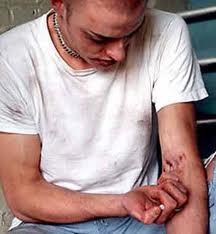A LOT of you replied to my brief ramblings on Harm Reduction. Some of you see it as almost poisonous — a kind of quicksand making it more difficult to quit using. Others see it as a valuable perspective for helping people “where they are,” without imposing conditions or restrictions. Some of you see it as an expression of kindness, others as short-sighted or even lazy, and some note that it does more good for the society at large than for addicts trying to recover. It’s good for all of us to be aware of this diversity of opinions.
I don’t think I can help provide unity, but here are a few more impressions I got from that conference.
I mentioned in one reply, last post, how struck I was by a speaker who looked like he was about to collapse right there on the podium. A slender young man who spoke in a halting voice, sometimes unable to find his words. He  talked of being a young gay man from a traditional Chinese family. He was rejected by his family and peers with such vehemence that he ended up wandering around Toronto like a stray puppy, looking for anyone he could follow home. Not surprisingly, sex was part of that equation, and, apparently not uncommonly, so was crystal meth. Clean needles and condoms were the furthest thing from his mind. Until he got sick. Now, HIV-positive and who knows what else, he stood there, quavering, clearing his throat, telling this group of strangers all about his shameful deeds. And everybody’s heart went out to him. There wasn’t one person in the room who didn’t wish they’d gotten to him first, not to put a halt to his experimentation but to help him survive it. When he told us he’d been clean for almost four years, the room erupted in waves of applause. But it didn’t seem he’d be a poster-child for HR or anything else for very much longer.
talked of being a young gay man from a traditional Chinese family. He was rejected by his family and peers with such vehemence that he ended up wandering around Toronto like a stray puppy, looking for anyone he could follow home. Not surprisingly, sex was part of that equation, and, apparently not uncommonly, so was crystal meth. Clean needles and condoms were the furthest thing from his mind. Until he got sick. Now, HIV-positive and who knows what else, he stood there, quavering, clearing his throat, telling this group of strangers all about his shameful deeds. And everybody’s heart went out to him. There wasn’t one person in the room who didn’t wish they’d gotten to him first, not to put a halt to his experimentation but to help him survive it. When he told us he’d been clean for almost four years, the room erupted in waves of applause. But it didn’t seem he’d be a poster-child for HR or anything else for very much longer.
 From that moment it was clear to me that harm reduction and abstinence were not opposing goals. And I was sold. I don’t think you can fully buy into harm reduction until you stare straight into the totality of harm.
From that moment it was clear to me that harm reduction and abstinence were not opposing goals. And I was sold. I don’t think you can fully buy into harm reduction until you stare straight into the totality of harm.
Karen, a syringe program coordinator talked with me for awhile. Big heart, yes. Weird ideas? Maybe not.
“All I want to do is house them,” she said, “give them somewhere they want to go back to. You want to make it cozy for them, help them furnish it, make it their safe place.”
You’d think that might make it more comfortable for addicts to keep on using. But that wasn’t her view.
“When that happens,” she said, “their using levels out and the risk-taking all but disappears. They stop sharing any equipment, they stick to one dealer, they tend not to use in groups, and the quantity goes down: crystal meth, Dilaudid, old-style oxycontin, you name it.”
Okay, you might wonder, but don’t you try to get them to stop? Apparently it’s hard to do both at the same time.
“If clients fail to stop using something they said they’d stop using, then I never bring it up again,” Karen said. “You never shame people, because shame is the hardest emotion, in my opinion. Kindness — that’s what you give them. You thank them for coming in.”
Others felt that way too. One heavily tattooed man who looked like he could bench-press his Harley told me, in the mildest voice: “The client is the boss. I’ll plan whatever you want…and at any point you want to change it, we’ll change it. Because it’s their life, not my expectations, that matter.”
 I never stopped wondering whether this was precisely the right approach. But I became convinced it was a lot better than nothing for seriously down-and-out users. If you met them with restrictions, rules, shame or disapproval, they would simply disappear. Disappearing was one thing they were particularly good at. That and destroying themselves.
I never stopped wondering whether this was precisely the right approach. But I became convinced it was a lot better than nothing for seriously down-and-out users. If you met them with restrictions, rules, shame or disapproval, they would simply disappear. Disappearing was one thing they were particularly good at. That and destroying themselves.
My talk was well received. Almost everyone there wanted to understand how addiction works, and the neurobiology was a lot of what they were missing. But policy is not my thing. And all the biology I could offer seemed a pale wand to wave at the pain that surfaced in that room.
I left feeling that harm reduction was a desperate response to a desperate situation, bound to help those who needed it most.
P.S. Check out this recent discussion forum in the New York Times. See if you can tell the good guys from the bad guys.

Leave a Reply